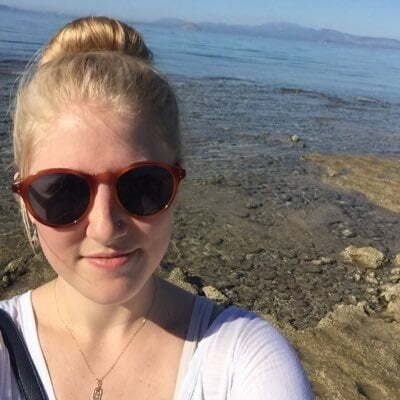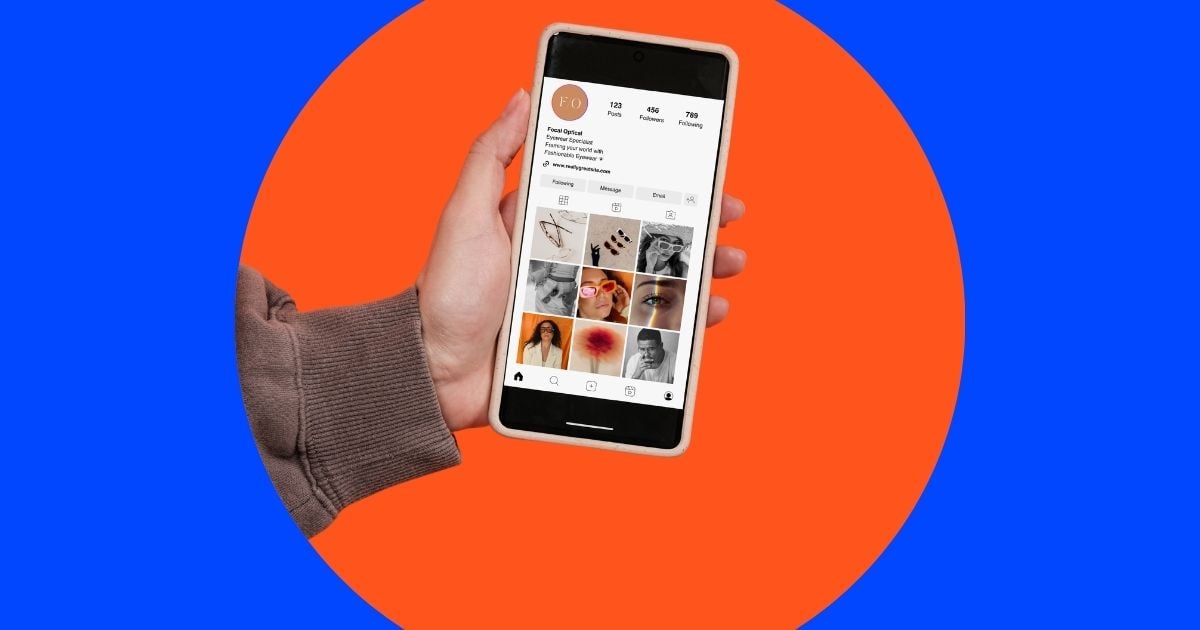Advertising on Snapchat has proven to be highly lucrative and, honestly, a lot of fun. Our team of paid acquisition specialists are particularly well versed in the importance of locking down a swipe up in six seconds or less. Though we may have originally underestimated the value of Snapchat, as the fast-moving social media introduced advertising for SMBs through a self-serve platform, we got back onboard the Snap bandwagon.
The 18- to 24-year-old age group continues to be drawn to Snapchat, despite rumors that the platform was being vacated by influencers. In fact, 186 million people use Snapchat every day, creating 3 billion snaps per day. If you are trying to advertise to this younger demographic, start with Snapchat.

In this guide, you’ll learn everything you need to know about Snapchat ads, including how to:
- Define your campaign goals
- Choose a Snapchat ad format
- Target your audience on Snapchat
- Measure your success
Define Your Snapchat Campaign Goals
Like other social platforms, Snap has a few different advertising offerings to choose from. Depending on your goals and budget, Snapchat advertising provides different attachment types to effectively increase your ROI. Here’s a breakdown of each campaign goal that Snapchat can help you accomplish.
Brand Awareness and Video Views
This is the simplest way to advertise on Snapchat, because you’re only asking users to watch a video – an action they are already in the app to do. Keep it short and sweet! Insider tip: Snapchat advertisers report that ad fatigue is far higher on Snapchat than other social advertising platforms. To avoid this, make a few different versions of your video ads.
Web Views and Conversions
Pushing prospects to your website and down the sales funnel to a conversion through Snapchat advertising is probably the most popular way to advertising goal for this platform. If you are a Snapchat user, you’ve absolutely been served ads that encourage you to swipe up, read more, or check out the site.
Lead Generation
For those trying to expand the top of your marketing funnel, Snapchat advertising has you covered. You can create ads within Ad Manager to drive users to download, form fill, or register.
App Installs and Engagement
Snapchat advertising is uniquely targeted to mobile users in ways that Facebook, Twitter, Pinterest, and others can relate to but never quite imitate. Use this to your advantage when building out a Snap advertising campaign! You know that if a user is opening, viewing, or swiping up on a snap, they are on their phone. Your prospects are inches of touchscreen away from the app store – or a tap away from a deep link placing them right where you want them in-app, but more on that in a minute.

Importantly, Snapchat advertising recently introduced down-funnel event tracking, from app installs to opens and conversions in-app. Use this with your third-party tracking platform to accurately measure the success of your campaigns.
Deep Linking in Snapchat Ads
Deep linking! A phenomenon that swept the mobile advertising world a few years ago, deep linking allows a user to land in a section of a mobile application. Snapchat advertising allows marketers to deep link from their ad into their app, bringing users exactly where you would want them. Be sure to test deep links against your run-of-the-mill links; you might be surprised at the results.
Brand Engagement
Almost half of college students on Snapchat would open a snap from a brand they didn’t know; almost three-quarters would open a snap from a brand they did know. Most of them are looking for discounts or promotions and are open to purchasing after viewing a product via Snapchat. The door to brand engagement is already wide open, your social media acquisition specialists just need to walk through it.
Catalog Sales
I’m not talking about your mother’s Land’s End in the mailbox – Snapchat advertising is bringing catalogs into a whole new age. With the release of Collection Ads, Snapchat now allows advertisers to drive catalog sales through a phone screen. Shoppers officially spend more time on their mobile devices than a desktop. Don’t fall behind the times!
Snapchat Ad Formats
When Snapchatters see advertising within the app, it feels seamless, which is a nod to their brand designers. Once you’ve determined your goals for Snapchat campaigns, you should consider which types of ads would work best to reach and engage your audience. The good news? Each of these formats is versatile! Pick your poison.
Snap Ads: The Basics
Snap Ads come in a variety of flavors, but what you should be thinking when you hear “Snap Ad” or “Top Snap” is your typical advertisement that prompts you to swipe up. Whether it is in a snap story or in the discover tab, the main point of action that snapchat advertising drives is a swipe. These live within stories and can drive users to a website, an app, a video, AR lens, or the app store.
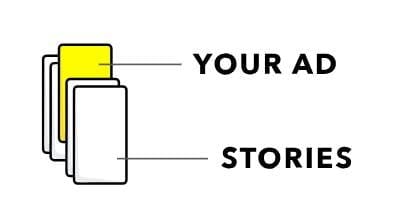
These ads are 3-10 seconds in length, and make sure to follow Snapchat advertising restrictions when you set them up:
- Upload a 1080 x 1920 px JPEG or PNG image, that will be converted into a 5 second video for a photo to video conversion
- Remember that if you add an attachment to your Snap Ad, Snapchat will apply a call to action and caret at the bottom of the advertisement
- Always include a brand name that matches the paying advertiser and a headline
- Format for full screen and vertical
- Make sure your ad is appropriate for viewers 13 years old and up
Story Ads
Snapchat Story Ads allow advertisers to place a branded tile in the Discover section of the Snapchat application. When users tap the tile, it opens into a collection of ads, anywhere between three and twenty placements. For this type of ad, Snapchat lays out the design for you, based on assets you deliver. You’ll need:
- A headline, up to 34 characters
- A brand name, up to 25 characters
- Attachments, if you’re optimizing for a swipe up
- And individual files for each Snap Ad within the story
Snapchat Story Ads are a branded content experience, not unlike playable or rewarded ads. Creating a narrative that will quickly engage users is your highest priority; don’t bother with an introduction! Dive right into it!

Snapchat Filters
I would bet that every Snapchat advertiser wishes that they could have designed the dog-face filter; imagine the reposts that drive monumental brand awareness. Though native to Snapchat, that filter is a fitting example of what advertisers should emulate when creating their own. These filters should represent your brand in a fun, relevant way. When designing and purchasing Snapchat filters, keep your customers in mind: Where will they will be using these? Why should they?
And remember these specs:
- 1080 by 2340-pixel image
- 300 KB or less
- PNG with transparent background
- 210-pixel buffer zone at the top and bottom of the screen for larger phones
- 74 pixels for the send arrow
- 32 pixels for the “sponsored” designation
- Portrait orientation
- Should occupy less than 25% of the screen
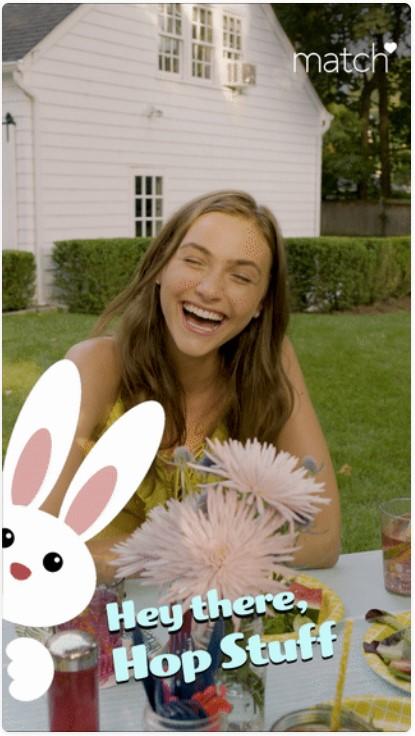
Finally, KISS (keep it simple, stupid). Try not to fill the Snapchat filter with dense, deep graphics. Give the people what they want!
AR Lenses
Lenses are monetizing a classic Snapchat interaction. Users were first drawn to Snapchat because of the amusing (and flattering) filters at their disposal – who doesn’t want everyone to see them in perfect lighting?! This ad type allows brands to create interactive moments through augmented reality. Snapchatters can flip up sunglasses, stick out their dog tongue, shake their head to reveal a robot underneath, all with a brand logo stuck in the corner.
There are two types of lenses, the Face Lens and World Lens. Face Lenses feature innovative technology to recognize a user’s eyes, mouth, and head to transform into the characters your brand creates. A World Lens detects your location to map the environment around you. Users can use the rear-facing camera (aka the normal camera) to view their world through a different light.
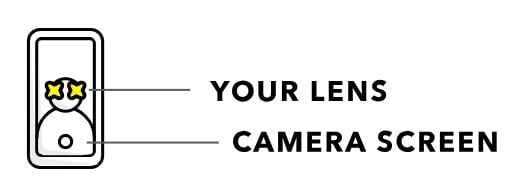
While there are some logical restrictions on the content of your lens (don’t use profanity or change the user’s race or skin color, etc.), the world is your oyster when it comes to these Snapchat ads. Some best practices to keep in mind:
- Lenses must feature your brand logo or name, but make sure not to obscure the face of the user. Snapchat recommends placing it in the top right or left corner.
- Snapchat will add a “SPONSORED” tag to the ad, which will appear for two seconds before disappearing.
Collection Ads
In Snapchat’s most recent development of their programmatic offering, they rolled out Collection Ads! These ads allow advertisers to showcase a series of products. This ad type also gives users a fun, seamless way to shop and buy. If you haven’t seen a Collection Ad in real life yet, it is a basic Snapchat video ad with a ribbon of thumbnail-sized products at the bottom.
Collection Ads can be created based on a product catalog, allowing the products featured to be dynamic, or they can be created manually with uploaded tile images. Because this ad type has more pieces than just a simple Snap Ad, there are more requirements to fill out within Ads Manager. They’ll ask for unique links, calls to action, and swipe up URLs, and then Snap will apply the “AD” denotation.
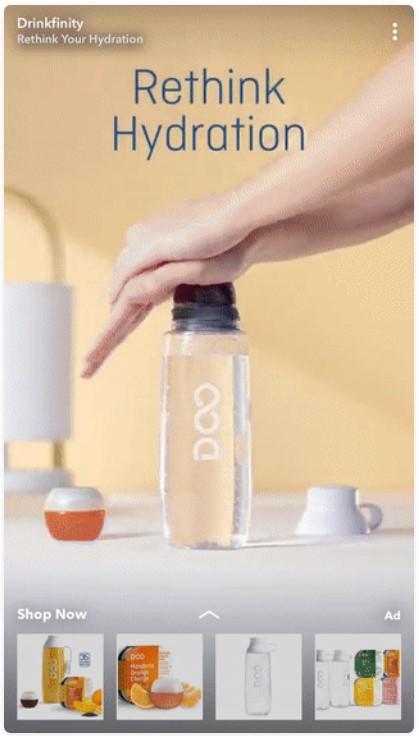
Targeting through Snapchat Advertising
Now that you’ve defined your campaign goals and started to create your ads, you’ll want to set up audience targeting so that these ads appear for your ideal prospects. Like Facebook, you can reach Snapchat users based on a crazy number of categories. Unlike Facebook, Snapchat will tell you exactly where this data is coming from – whether it is Comscore, Nielsen, Placed, Datalogix, or any other data provider. This means that you can get super specific: you can target Fox News viewers, moms with kids in high school, recent visitors of an autobody shop, people with an interest in craft beer – there are countless possibilities.
For Filter and Lens ads, you’ll be prompted to select a location, but you can layer location onto other Snapchat ads, as well. Snapchat Ads Manager allows you to select a state, city, or zip code, or you can set a radius around a certain location.
Finally, like their social advertising counterparts, Snapchat allows marketers to create custom audiences and lookalikes. Lookalikes can be based on a file from your own CRM of prospects or website visitors. Custom audiences can target the same people – visitors or prospects – and retarget Snapchatters that have already engaged with your ads.
Measuring Success through Snapchat Advertising
While every platform advertises a suite of analytics, Snapchat’s might be my favorite. While staying on brand – everything is yellow! – they highlight segments that interact with your ads, even if you did not include those specific segments in the campaign. By increasing the relevance of your campaigns, you are improving the user experience and saving money. Basically, the platform helps you improve your campaign targeting and cut down costs. It’s a win-win-win for advertisers, Snapchat, and Snapchatters.
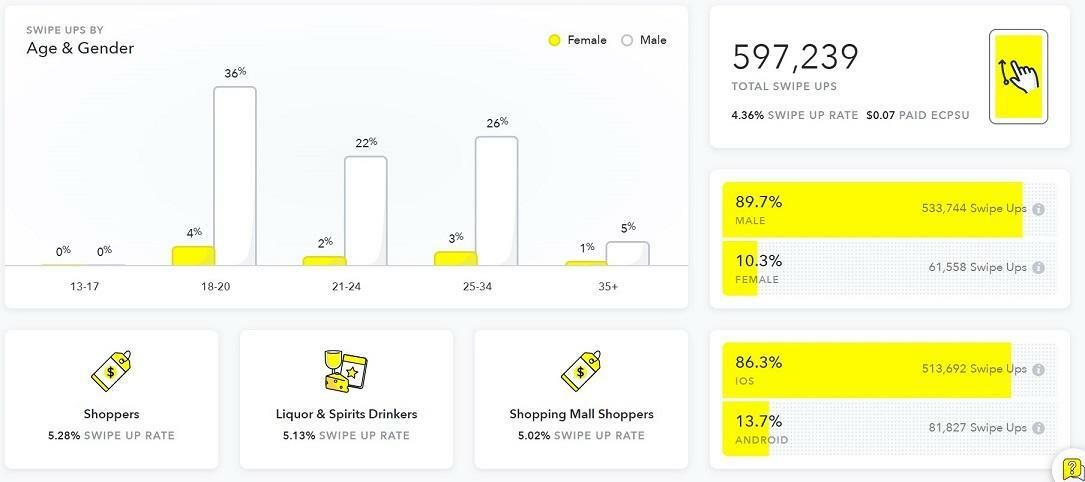
Pay attention to these stats! In the campaign highlighted above, Snapchat let us know that Shoppers, Liquor & Spirits Drinkers, and Shopping Mall Shoppers (how specific is that?!) were most likely to swipe up on the advertisement. By narrowing our scope to those specific segments – and cutting down on females and android users – we were able to decrease the cost-pe-swipe up by a couple of cents. Two pennies don’t seem like that big of a deal, but two pennies 600,000 times? That makes a dent.
Now, Go and Get Snapping!
All in all, Snapchat has a robust advertising platform, through which you can control your own destiny using their Ads Manager. If you’re a direct-to-consumer brands, give it a try. It’s cheap, fun, and maybe you’ll see success!

